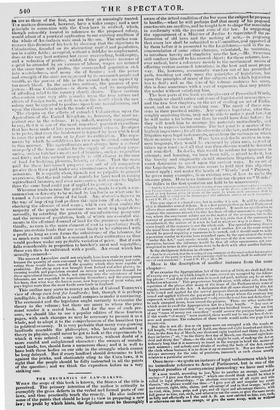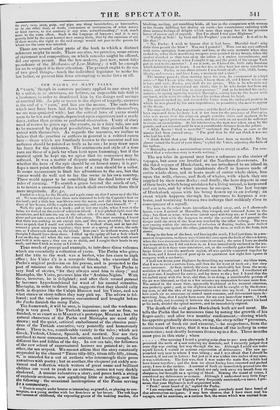THIS MECHANICS OF LAW-MAKING.
WHEN the scope of this book is known, the fitness of the title is perceived. The primary intention of the author is critically to exemplify the gross defects in the verbal and formal parts of our laws, and thus practically teach the remedy. He also indicates some of the points that should be kept in view in preparing a new law; to profit by which hints, the legislator must be thoroughly
aware of the aetual condition of the Jaw upon the subject he proposes to handle,—whet: he will perhaps find that many of his proposed enactments are needless, and be taught hew to shape the remainder in conformity with the present state of the law. In suggesting the appointment of a Minieter of Justice t r luperinteih the re- formation of old laws and the making of new,—in proposing that every law shall be submitted to a Committee, tind approved of
by them before it is presented to time Le:,islature,—aid in the re- commendation of some other changes, calculated, he maintains, to introduce brevity and simplicity into the law,—Mr. SYMONDS still confines himself to his avowed object; for these reformirhow- ever radical, have a reference merely to the mechanical 111e4116 of effecting certain assumed intentions, in the best and most prcper way. He, however, occasionally wanders out of his prescribed path, touching not only upon the principles or legislation, but upon the principles of many of the subjects with which legislation has to deal ; and as the size of his volume restrieis his space, this is done sometimes with a sort of vagueness, that :nay puzzle the reader without satisfying him.
The best parts of the book are the! lossary of Proscribed Words, --thought we should rather call it one of legislatorial svnony mes,— and the two first chapters, on the art of reading an act of Parlia- ment, and on the art of making one. The merit of these con- sists in their practical utility. Any embryo legislator, after tho- roughly mastering them, may not be able to make a good law, bat he will make a far better one then lie could have done before; for they will teach him to arrange his materials methodically, awl clearly to express his intentions. The last point is a matter of the highest importance ; for all the obscurity of the law, and much or the litigation upon legal instruments, arises from the verbiage in which their meaning* is couched. Were laws and deeds written in com- mon language, they would be ex:twilled by plain men, immstead of taken upon trust ; stool all that was then obscure would be detected and remedied. In deeds, this would be perilous for ignorance to attempt; and learning, we have been told, is afraid to do it, lest the brevity and singularity sluathl stimulate litigation, and the court determine to stand upon the anci,.mt ways. In an act of the Legislature, Mr. SvmoNos scents to hold that this objection cannot apply; and under the heads of "Words" and "Phrases,- Ire gives many examples, from existing acts, of how to make the obscure plain. Here is an instance from the chapter on "Words:" the italics in the first quotation are held to be unnecessary. " And be it j;erther eottrte,t, that the 'leaving of any summons eta gale; t ed L, f r..sard rnry Cortoti,ittat. r, Assiona Co JIIN'?I'1' of the Prare. rude r this Art, at llto lismd or last know n plate of :Outdo of the party to whom such soft:moos shall be directed. shall in tetrt our be deemed good awl sufficient service of such sem:oohs," 4 amt:, W. IV, e. 76, s.
This may appear a selected ease, but in reality it is not. It will be admitted that it illustrates several defects. It is a filst paiuciple that an Act of Parliament affects time matters only that relate to its subject. It needs no specification to separate the summons intended by this Act from all other sumnion,es, especially, too, where the enactment relates not to the matter of the summons, but to the manner of proceedhig eonneeted with it ; for it is plain that if the summons be unauthorized, the service of it must be had in whatever way it is done. The mere length of the sentence is not the whole evil. The special phrasing inverts the mind from the object of the clause ; and if another Act in the same subject should be passed requiring a summons to lie served, and it should omit to make a provision similar to the one here remarked upon, by the operation of the words " under this Act," such service would, in the ease of the new SUIIIIII0119, he in- operative, because the inference would be that all other summonses, not coo- templated in terms in this provision were to be dealt with after another
Is the abridgment deficient in cleat ness?
" And be it enacted, that the leaving of any summons at the usual or last known place of abode of the party to whom such summons shall be directed, shall be sufficient ser- vice of such summons." 4 and 5 W. 1V, c 76, s. 90.
Here is the description of another instance from the same chapter— If we examine the Appropriation Act of the session of 1834, we shall find that of twenty-six pages, to which length it runs, several are occupied by the follow- ing phrase: "and that the said suns be issued and paid, without any fee or other deduction whatever." This preposterous length came, with other aids, from the repetition of the phrase after many of the items of the Parliamentary votes of supply, recounted in the Act. A declaration that all sums directed by this Act to be issued and applied fur the several purposes therein mentioned should be issued and applied without the payment of a fee, except where the contrary was expressed, would, with the addition of " subj,:ct to the usual fees and deductions " to such excepted items, have served the purpose. There are other verbosines which assist to swell the Appropriation Act to a tinge length. " Any sunk. or sums of money not exceeding " are repeated two bundled tines; the me- ton of any "sums of money not exceeding " would answer the purimse better ; and if the words "of money " were omitted, there would not he one jot less of clear- ness and precision. The redaction of these words would make one page less in twenty-six. But this is not all : five or six pages more are occupied with the wordy, at full length, "from the first day of April, one thousand eight hundred and thirty- four, to the first day of March, one thousand eight hundred and thirty- fire, both days inclusive ;" or, " to the thirty-first day of ;March, one thousand eight hun- dred and thirty-five " alone,—to the end, it might be said, of making the Act so tediously long that it is necessary to insert in the margin in brief the matter of each sentence ; and nobody ever thinks of reading the body of the Act, except the clerk whose business it is to draw it up or examine it. Nor are these words always necessary for the sake of precision, inasmuch as each clause usually relates to a particular service.
Once more—we quote an instance of legal verboseness which has no immediate reference to Acts of Parliament, but is one of the happiest parodies of conveyancing phraseology we have met with.
If a man would, according to law,•give to another an orange, instead of saying—" I give you that orange," which one should think would be what is called in legal phraseology, "an absolute conveyance of all right and title therein," the phrase would run thus—" I give you all and singular my estate and interest, right, title, claim, and advantage of and m that orange, with alt its rind, skin, mice, pulp, and rip, and all rigid and advantage therein, with full power to bite, cut, suck, and otherwise eat the same, or give the same am ay, as fully and effectually as I the said A. B. am now entitled to Lite, cut, suck, or otherwise eat the same orange, or give the same away, with or without its riot, shim juice, pulp, and pips, any thing hereinbefore, or hereinafter, or in any other deed, or deeds, instrument or instruments, of what nature or kind soever, to the contrary it any wise, notwithstanding ;" with much more to the aline effect. Such is the language of lawyers; and it is very gravely held by the most learned men among them, that by the omission of any of these words, the right to the said orange would not pass to the person for whose use the same was intended. There arc several other parts of the book to which a distinct reference might be made. There are also, we perceive, some errors of statement and composition, on which remarks might be offered, did our space permit. But the law-makers, just now, must take precedence of the Mechanics. of Law-Making ; it will be enough for us to suggest it to their attention. The perusal ought to do one of two good things,—teach the individual legislator to make his law better, or prevent him from attempting to make laws at all.



























 Previous page
Previous page